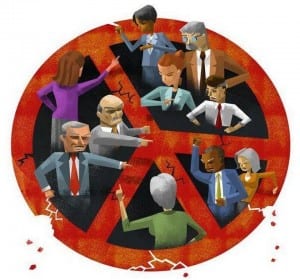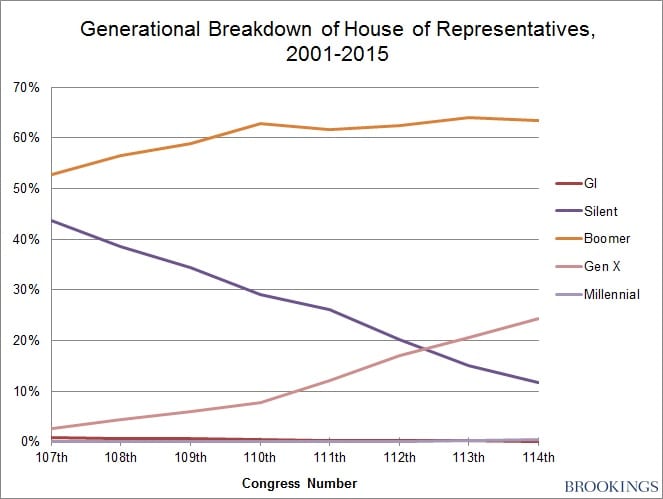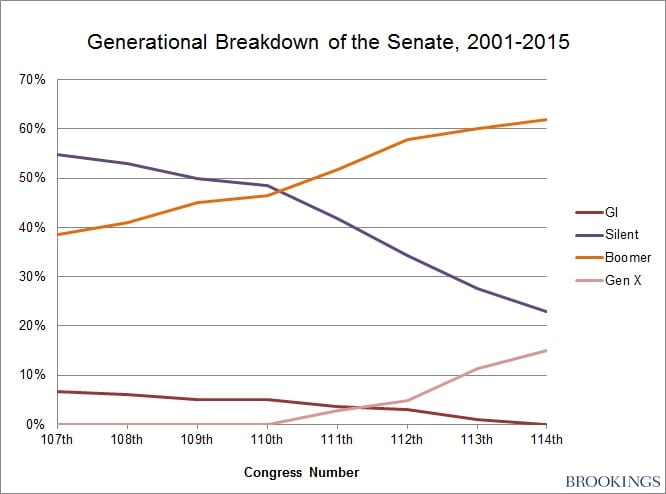Why I Can’t Find Any Fun With – or Long term Benefit From – the “Generational” Bad Manners of Boomer Bashing
By Anne L. Holmes, APR
NABBW’s “Boomer in Chief”
 Recently, Rick Montgomery, a reporter for the Kansas City Star called me, in my role as the Boomer in Chief of the National Association of Baby Boomer Women, for an interview.
Recently, Rick Montgomery, a reporter for the Kansas City Star called me, in my role as the Boomer in Chief of the National Association of Baby Boomer Women, for an interview.
He was seeking my point of view on a generational demographic tidbit he had picked up recently: the fact that sometime this year, the Baby Boomer generation will no longer be country’s largest. Due to our kids’ aging into adulthood, we’ll be losing our famed demographic “pig in the python” position to a younger generation, the Millennials.
As the head of the NABBW, I’ve been aware of this fact for about a year, and don’t really find it that concerning. Whether or not Boomers will be surpassed in numbers, doesn’t really matter at this point, IMHO. We’re still vital, we’re still dealing quite capably with our role as the “Sandwich Generation,” and we’re still making things happen in this world.
Not to mention that as we continue to age, we will keep changing the world, just as we have done all our lives. It is the only way the US can possibly manage the fact that by 2024, this country will contain more than 78 million people who are 60-plus! (I say “more than,” of course, because there are still going to be people older than Boomers who are living and whose needs need to be accounted for…)
But Rick wanted to know whether or not I would agree that we Boomers, with our purportedly self-centered, (read selfish) or “what’s in it for me?” point of view are the reason the US is plagued by political gridlock these days. In other words, he wanted to know if I would indulge with him in a bit of “Boomer Bashing…”
I told Rick very clearly that I couldn’t buy this black or white attitude. He was intrigued, so we spent at least an hour on the phone while I shared my point of view. Which shouldn’t have been hard for Rick to understand, as he himself is a Baby Boomer, slightly younger than I am.
I began by pointing out that merely by the fact of our sheer numbers, we Baby Boomers are not – and never have been – a group that can be easily categorized.
Going back into our history, this attitudinal variety was apparent.
As an example, look at the period of the Viet Nam war and the attendant protests.
- First of all, we didn’t start that fire: It had been burning for decades before our young men started objecting to the draft. Technically this war started in 1955, but there had been war in Indochina long before that.
- Since Baby Boomers are born between 1946 and 1964, none of us was old enough to have had anything to do with that war’s beginning. And few of us felt a burning desire to give our young lives in order to try to prevent communism in that part of the world. Especially since the North Vietnamese and the Viet Cong were fighting more of a colonial war. With the goal of reunifying it.
- Yet in junior high school, when I first heard about draft dodgers fleeing to Canada, there were also young men contacting congress, hoping to be tapped for schooling at West Point or signing up for ROTC…
- So there were Baby Boomers on both sides of the war
- As for me, I attended one of the major “war protest schools” from 1970 to 1975 — the University of Wisconsin-Madison. The governor would regularly call out the National Guard during “Dow Days,” the week when Dow Chemical — manufacturer of Napalm — came for campus interviews.
Personally, the worst of the campus war protesting was over by the time I matriculated. It ended on a sultry night in late August 1970, with the bombing of Sterling Hall, which resulted in the innocent death of a grad student researcher, Robert Fassnacht.
- Fassnacht was a post-doc researcher working in the field of superconductivity. His work had nothing to do with warfare. He’d stayed late at the lab, in preparation for going on vacation with his wife and two kids.
- His tragic death came at the hands of four anti-war protesters armed with a bomb intended to take down the University’s Army Math Research Center, located within Sterling Hall.
- Once this happened – which was shortly before the Kent State shootings in Ohio – antiwar protests on the UW-Madison campus simmered down to more sedate stuff, like candlelight marches to the capital building.
Ironically, one of those Sterling Hall bombers, Karl Armstrong, was caught, served time, and later returned to Madison, where he sold my daughter — and thousands of other UW-Madison students — lemonde from a stand on the campus mall.
Youthful Idealism Put Aside But Not Lost
I also talked to Rick about the fact that we Boomers have not lost our idealism and our desire to improve the lives of those less fortunate. I discussed the fact that many of us felt we had to ease up on living lives focused on our idealistic, altruistic values, because we grew up, had children, and needed to provide for them.
So, espousing our goals of equal rights for women, and demanding our rights to work, we Boomer women went out into the world as workers, as did our spouses. We tried to balance work and home lives, often nearly killing ourselves in the process, and struggling to learn to live with stress.
This didn’t mean we had forgotten our ideals. It just meant that we set them aside for a few years, so as to materially provide for our children as best as possible. And thus was born the latch-key kid. Those kids who may not have come home to a mom handing out warm cookies and cold milk, but who were blessed in so many ways with material things.
Which is why those Millennials Montgomery writes about, were blessed with an abundance of “stuff:” And by “stuff” I mean their own bedrooms — no sibling sharing — which were loaded with fine stereos, phones and TVs. Not to mention loaded clothes closets, video games and toys — and ample allowances.
This “kidly swag” often also included trips to Europe, personal cars, and the best education we Boomers could buy.
BUT, I averred, now that we Boomers are getting toward retirement age, we are reclaiming our altruism. We are working to give back to our communities, and the earth. And we’re still looking for peace.
I backed up that statement with facts and stories about Boomer participation and support of programs like Doctors Without Borders, the Peace Corps, Habitat for Humanity, Big Brothers, Big Sisters, the Red Cross volunteers who go into storm damaged areas, etc. Not to mention the Boomers who volunteer in their churches, in hospitals and prisons and through service organizations like Rotary or Kiwanis.
 Rick and I had what I thought was a good chat. But the resulting article, which I’ve reprinted below, doesn’t adopt my big picture point of view.
Rick and I had what I thought was a good chat. But the resulting article, which I’ve reprinted below, doesn’t adopt my big picture point of view.
Rick focuses on the current state of American politics, and leans into boomer bashing. Shame on you, Rick! I guess on this article we’ll have to agree to disagree. But I urge you to keep trying to look at the bigger picture. And remember, we Boomers are not done yet!
For the record, here’s his story:
Upset by political gridlock? Blame the baby boomers
By RICK MONTGOMERY
The Kansas City Star
04/04/2015 7:00 AM ~ 04/05/2015 12:26 AM
 At some moment this year a U.S. baby boomer will die and, if census forecasts are right, the generation born between 1946 and 1964 will no longer be the nation’s largest.
At some moment this year a U.S. baby boomer will die and, if census forecasts are right, the generation born between 1946 and 1964 will no longer be the nation’s largest.
Won’t matter. Years after their millennial descendants overtake them in numbers, aging boomers probably will be setting America’s course and, many contend, building a legacy as the generation too divided to move government forward.
Sorry, Beatles: We can’t work it out.
In poll research and punditry, boomers who chose politics are taking heat for being in charge during an era of incivility and Washington gridlock.
In Congress, where the last World War II veteran retired in January, nearly two-thirds of lawmakers hail from the postwar population boom and came of age in the unrest of the 1960s and ’70s.
A recent report out of the Brookings Institution notes: “The primary political output of the divided boomers has been frustrating gridlock and historically low evaluations of congressional performance.”
What happened to the peace symbols and smiley faces? Today, demographers and survey takers are drafting a not-so-communal narrative of a generation that they say has been split on key issues for decades, leading now to policy standoffs that may continue for several years.
“Any generation that’s in charge will always get the blame, or the credit, for the state of affairs,” said boomer Matt Thornhill, founder of a for-profit market research initiative called Generations Matter.
“But the evidence is stacked up high against the boomers, at least when it comes to the world of divisive politics.”
Experts tie the divisions to seminal political and cultural clashes during the boomers’ early adulthood, when people tend to form a lifelong set of beliefs.
To name a few: the civil rights movement, the Vietnam War protests, the 1970 shootings at Kent State University, Watergate, changes in gender roles and, for younger boomers, the Reagan Revolution.
Past characterizations of the boomers — painted with a broad and overly psychedelic brush, researchers say — tended to pit them against older Americans, not so much against each other.
“Remember, baby boomers were on both sides of the guns at Kent State,” where four students died when National Guardsmen opened fire during a protest, said generation tracker Mike Hais. He co-wrote the report for Brookings with University of Southern California communications professor Morley Winograd.
“Idealist generations” and the dysfunction they can wreak occur in cycles, said Hais, 72.
To thinkers such as him and Winograd, all of U.S. history has pitched and bobbed on generational waves that direct the nation’s destiny.
A cottage industry of generational tracking counts no fewer than 19 distinct age groups dating back to the 16th century. Each has its own name and every four or five become as deeply divided as analysts say boomers are today. The “transcendental” generation, for example, rose to political dominance before the Civil War, debating slavery.
Still, scholars quibble on exactly which birth years a generation begins and ends.
The Pew Research Center in January reported that boomers soon will become the second largest among America’s living generations, their crown passed to millennials. The Gen Xers — those late-30- and 40-somethings in between — just lacked the numbers, though their presence in Washington is growing.
Pew identified millennials as ages 18 to 34, numbering about 75 million, and boomers from 51 to 69, numbering just a hair more and including President Barack Obama, 53.
Age brackets vary depending on the research you read. And for boomers the latest research has not been kind.
Polarized grumps
Some argue that baby boomers as a whole have been society’s pincushion since the oldest became teens around 1960.
A half century later, the Great Recession ate their 401(k)s and put many out of work. Now they’re taking a beating in blogs for not having saved enough and being a bit too eager to gobble up Social Security, potentially shrinking the safety nets of future retirees.
Cast as hippies who evolved into power-dressing yuppies, they are now labeled in at least one poll analysis as “grumpy.”
When asked in a 2014 Wall Street Journal/NBC News poll whether their children’s generation would enjoy a better life than what they’ve had, 82 percent of Americans ages 50 to 64 said no.
That was the most pessimism that any living generation expressed and a 14 percent jump for the boomers since they were asked the same question two years earlier.
Anne L. Holmes, herself a boomer at 63, doesn’t get all the negativity.
“I guess I’m a little more optimistic,” said Holmes, chief executive of the 7,000-member National Association of Baby Boomer Women.
Her generation, after all, saw women and minorities rise to top ranks in business and politics. Boomers passed on to their children a widening social tolerance that past generations would never imagine.
“Altruism is part of the baby boomer psyche,” she said. As more transition from jobs to retirement, “there’s a contingent of us who’ll say, ‘Now is the time. I’m going to do good for the world.’”
But first they’ll have to think beyond themselves, which some say the boomers haven’t demonstrated enough.
Thornhill of Generations Matter goes so far as to blame Benjamin Spock, the best-selling author of child care books. His advice early in the baby boom spurred parents to start treating their kids as individuals, each with specific needs separate from their siblings’ wants and wishes.
“That was different,” Thornhill said. “You had each child vying for Mom and Dad’s attention. They developed a mentality of ‘What’s in it for me?’”
They grew into the most individualistic generation ever, his thinking goes: “When you put them into politics, of course they’re going to be thinking of what’s in their own interests.”
Boom. Gridlock.
 Demographers William Strauss and Neil Howe predicted it in a thick book titled “Generations: The History of America’s Future,” published in 1991.
Demographers William Strauss and Neil Howe predicted it in a thick book titled “Generations: The History of America’s Future,” published in 1991.
Just five years later, on cue, a budget showdown pitted the first boomer president, Bill Clinton, against then-U.S. House speaker Newt Gingrich, three years Clinton’s elder. The federal government twice shut down before the two leaders reached a compromise.
“The generation that invented McMansions and the exurbs have never been big on group cooperation,” Howe, 63, blogged more recently, “and that isn’t going to change now.”
 In presidential elections since 2000, when boomers for the first time took the majority of House seats, the generation’s voters have split close to 50/50 in party preference.
In presidential elections since 2000, when boomers for the first time took the majority of House seats, the generation’s voters have split close to 50/50 in party preference.
Older age groups have tracked mostly Republican; the millennials, heavily Democratic.
On specific issues, too, the boomers are evenly divided.
By Pew’s numbers, just under half of U.S. boomers supported same-sex marriage in 2014. Just over half supported legal pot. On abortion, the narrow divide hasn’t changed much in 30 years.
Fast forward
Of 16 members of Congress from Kansas and Missouri, 11 are baby boomers.
On the Democratic side, U.S. Sen. Claire McCaskill of Missouri was born in 1953 — just 10 months before U.S. Sen. Jerry Moran, a Kansas Republican who votes along tea party lines.
Raised in the same times, in similar Midwestern surroundings, they formed vastly different opinions.
Fast forward to 2015.
In a University of Kansas journalism class called Infomania, all of the students have laptops. But these millennials have varied opinions too.
On the 9/11 terrorist attacks — perhaps the one event that most shaped their generation’s worldviews — junior Nathan Law, 21, observed among his peers “a rebirth of patriotism” and heightened sense of America’s vulnerability. He plans to serve in the U.S. Army after getting a degree in atmospheric science.
Classmate Shaleah Volkman, 32, saw the war on terror in another way.
“Politics, oil and money,” she said. “It’s complicated. … I think that there’s never going to be an end to war.”
Forty miles east, millennials in a political science class at the University of Missouri-Kansas City weren’t entirely on the same page either.
“We’ve gone too far away from our traditional American principles, and I think young people will bring those back,” said student Lucy Brill, 27.
Not if Cameron Briggs, 30, has his way.
Throughout the 20th century, he said, big commerce tucked in bed with big government created “a domino effect of war, banking and debt.”
The millennials are not monolithic. But Briggs’ distrust of powerful institutions — a status quo that helped many boomers maintain decent lives — is one sentiment that polls show runs strong.
As such, many scholars believe real change could come when the leadership batons are passed to younger Americans.
The resume on millennials reads fairly clear: They’re wired together, mostly optimistic, exposed to a mix of cultures and highly supportive of gay rights.
They seem to value collectivism — solving problems through information sharing and crowdfunding.
“They’re not as polarized on issues, not as evenly split, as the boomers,” said generational analyst Eric B. Schnurer, 56, who heads a public policy consulting firm that advises state and local governments.
He predicts that when boomers do relinquish power, one of the top items on the public agenda will be to splinter large institutions and try to undo the two-party approach to governing, which only divides the electorate.
At UMKC, student Briggs tossed back his head in delight: “I pray for it!”
Read more here: http://www.kansascity.com/news/government-politics/article17411765.html#storylink=cpy


